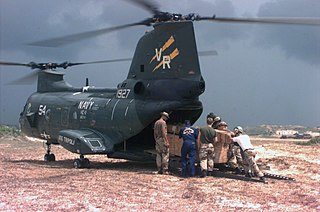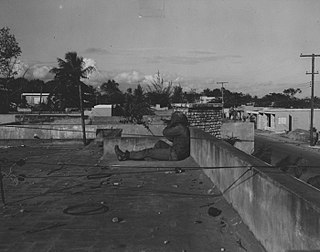
The United Nations Security Council (UNSC) is one of the six principal organs of the United Nations (UN) and is charged with ensuring international peace and security, recommending the admission of new UN members to the General Assembly, and approving any changes to the UN Charter. Its powers as outlined in the United Nations Charter include establishing peacekeeping operations, enacting international sanctions, and authorizing military action. The UNSC is the only UN body with authority to issue resolutions that are binding on member states.

Peacekeeping comprises activities, especially military ones, intended to create conditions that favor lasting peace. Research generally finds that peacekeeping reduces civilian and battlefield deaths, as well as reduces the risk of renewed warfare.
A civilian is a person who is not a member of an armed force nor a person engaged in hostilities.

The United Nations Mission in Sierra Leone (UNAMSIL) was a United Nations peacekeeping operation in Sierra Leone from 1999 to 2006. It was created by the United Nations Security Council in October 1999 to help with the implementation of the Lomé Peace Accord, an agreement intended to end the Sierra Leonean civil war. UNAMSIL expanded in size several times in 2000 and 2001. It concluded its mandate at the end of 2005, the Security Council having declared that its mission was complete.

The United Nations Organization Stabilization Mission in the Democratic Republic of the Congo, or MONUSCO, is a United Nations peacekeeping force in the Democratic Republic of the Congo (DRC). At the request of the DRC's government, it is withdrawing completely from the country by the end of 2024.

The United Nations Operation in Somalia II was the second phase of the United Nations intervention in Somalia and took place from March 1993 until March 1995, following the outbreak of the Somali Civil War in 1991. UNOSOM II carried on from the transitory United States-controlled (UN-sanctioned) Unified Task Force (UNITAF), which had been preceded by UNOSOM I. Notably, UNOSOM II embarked on a nation-building mission, diverging from its predecessors. As delineated in UNSCR 814, the operation's objectives were to aid in relief provision and economic rehabilitation, foster political reconciliation, and re-establish political and civil administrations across Somalia.
The Military Staff Committee (MSC) is the United Nations Security Council subsidiary body whose role, as defined by the United Nations Charter, is to plan UN military operations and assist in the regulation of armaments. Although the Military Staff Committee continues to exist, negotiation efforts between the United States, the Soviet Union and other nations in the late 1940s failed, and the committee has since been largely defunct, only serving in an advisory capacity.

The Peace and Security Council (PSC) is the organ of the African Union in charge of enforcing union decisions. It is patterned somewhat after the United Nations Security Council. The PSC is also the main pillar of the African Peace and Security Architecture (APSA), and works with other pillars of the APSA in order to promote "peace, security and stability in Africa". The specific goal of the Peace and Security Council (PSC) is the "prevention, management and resolution of conflicts". To achieve these goals, it involves subsidiary organizations such as the Military Staff Committee and the Committee of Experts.

The United Nations Mission in Liberia (UNMIL) was a United Nations peacekeeping operation established in September 2003 to monitor a ceasefire agreement in Liberia following the resignation of President Charles Taylor and the conclusion of the Second Liberian Civil War (1999–2003). At its peak it consisted of up to 15,000 UN military personnel and 1,115 police officers, along with civilian political advisors and aid workers.

The Unified Task Force (UNITAF) was a United States-led, United Nations-sanctioned multinational force which operated in Somalia from 5 December 1992 until 4 May 1993. A United States initiative, UNITAF was charged with carrying out United Nations Security Council Resolution 794 to create a protected environment for conducting humanitarian operations in the southern half of the country.
Chapter VII of the United Nations Charter sets out the UN Security Council's powers to maintain peace. It allows the Council to "determine the existence of any threat to the peace, breach of the peace, or act of aggression" and to take military and nonmilitary action to "restore international peace and security".

The African Standby Force (ASF) is an international, continental African, and multidisciplinary peacekeeping force with military, police and civilian contingents that acts under the direction of the African Union. The ASF is to be deployed in times of crisis in Africa. Addis Ababa, Ethiopia, serves as the Force's Headquarters. Douala, Cameroon, was selected in 2011 as the site of the AU's Continental Logistics Base (LOGBASE).
The United Kingdom is a founding member of the United Nations and one of five permanent members of the UN Security Council.

United Nations Security Council Resolution 1706, adopted on August 31, 2006, after recalling previous resolutions on the situation in Sudan, including resolutions 1556 (2004), 1564 (2005), 1574 (2004), 1590 (2004), 1591 (2005), 1593 (2004), 1663 (2006), 1665 (2006) and 1679 (2006), the Council expanded the mandate of the United Nations Mission in the Sudan (UNMIS) to include deployments in Darfur to enforce the Darfur Peace Agreement.
The United Nations Peacekeeping efforts began in 1948. Its first activity was in the Middle East to observe and maintain the ceasefire during the 1948 Arab–Israeli War. Since then, United Nations peacekeepers have taken part in a total of 72 missions around the globe, 12 of which continue today. The peacekeeping force as a whole received the Nobel Peace Prize in 1988.
Peacekeeping by the United Nations is a role of the UN's Department of Peace Operations as an "instrument developed by the organization as a way to help countries torn by conflict to create the conditions for lasting peace". It is distinguished from peacebuilding, peacemaking, and peace enforcement although the United Nations does acknowledge that all activities are "mutually reinforcing" and that overlap between them is frequent in practice.

The United Nations Force Intervention Brigade (FIB) is a military formation which constitutes part of the United Nations Organization Stabilization Mission in the Democratic Republic of the Congo (MONUSCO). It was authorized by the United Nations Security Council on 28 March 2013 through Resolution 2098. Although it is not the first instance in which the use of force was authorized by the UN, the Force Intervention Brigade is the first UN peacekeeping operation specifically tasked to carry out targeted offensive operations to "neutralize and disarm" groups considered a threat to state authority and civilian security. In this case, the main target was the M23 militia group, as well as other Congolese and foreign rebel groups. While such operations do not require the support of the Armed Forces of the Democratic Republic of the Congo (FARDC), the Force Intervention Brigade often acts in unison with the FARDC to disarm rebel groups.

The Mission of the Representative of the Secretary-General in the Dominican Republic (DOMREP) was a peacekeeping operation established in 1965 by the UN to observe the ceasefire agreement between the two de facto authorities in the Dominican Republic during the Dominican Civil War. DOMREP was instructed to report any breaches of the agreements between the Constitutionalists led by Juan Bosch and Francisco Caamaño, and Loyalists commanded by Elías Wessin y Wessin and backed by the United States. Once the new Dominican constitutional government was formed, DOMREP withdrew.









